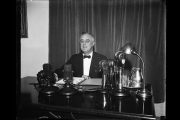NAACP chairman Julian Bond said last week that the Dr. Martin Luther King we celebrate is an “anesthetized” version of the man who really existed.
Bond knew King personally and was a student in the only class King ever taught. In a January 19 interview on The Young Turks Internet news program the day after Martin Luther King Day, he said of King: “We’ve transformed him into kind of a cut-leaf figure, someone who had a dream and spoke these magnificent words, but we don’t remember the King who was the critic of capitalism who said to Charles Fager when they were in jail together in Selma in 1965 that he thought a modified form of socialism would be the best system for the United States…. So we’ve anesthetized him. We’ve made him into a different kind of person than he actually was in life. And it may be that that’s one reason he is so celebrated today because we celebrate a different kind of man than really existed. But he was a bit more radical, not terribly, terribly radical, but a bit more radical than we make him out to be today.”
This is not the first time Julian Bond referenced the forgotten Martin Luther King. In an article originally appearing in the April 4, 1993 Seattle Times, Bond said: “Today we do not honor the critic of capitalism, or the pacifist who declared all wars evil, or the man of God who argued that a nation that chose guns over butter would starve its people and kill itself. We do not honor the man who linked apartheid in South Africa and Alabama; we honor an antiseptic hero.” He added that “we have stripped his life of controversy” and “remember and celebrate half a man.” In the same article, Bond quoted King saying: “There must be a better distribution of wealth…. We can’t have a system where some of the people live in superfluous, inordinate wealth while others live in abject, deadening poverty.”
Of course, Martin Luther King did not call for socialism or a redistribution of wealth in his famous “I Have a Dream” speech. The man who gave that stirring speech calling for justice and brotherhood for all Americans is the man we know and celebrate on Martin Luther King Day. But how many of us are familiar with Dr. Martin Luther King’s interview in the January 1965 issue of Playboy? In that largely forgetten interview, King provided a glimpse of the man most Americans do not know and celebrate today:
Playboy: Do you feel it’s fair to request a multibillion-dollar program of preferential treatment for the Negro, or for any other minority group?
King: I do indeed. Can any fair-minded citizen deny that the Negro has been deprived? Few people reflect that for two centuries the Negro was enslaved, and robbed of any wages — potential accrued wealth which would have been the legacy of his descendants. All of America’s wealth today could not adequately compensate its Negroes for his centuries of exploitation and humiliation. It is an economic fact that a program such as I propose would certainly cost far less than any computation of two centuries of unpaid wages plus accumulated interest. In any case, I do not intend that this program of economic aid should apply only to the Negro; it should benefit the disadvantaged of all races….
Playboy: If a nationwide program of preferential employment for Negroes were to be adopted, how would you propose to assuage the resentment of whites who already feel that their jobs are being jeopardized by the influx of Negroes resulting from desegregation?
King: We must develop a federal program of public works, retraining and jobs for all — so that none, white or black, will have cause to feel threatened. At the present time, thousands of jobs a week are disappearing in the wake of automation and other production efficiency techniques. Black and white, we will all be harmed unless something grand and imaginative is done. The unemployed, poverty-stricken white man must be made to realize that he is in the very same boat with the Negro. Together, they could exert massive pressure on the Government to get jobs for all. Together, they could form a grand alliance. Together, they could merge all people for the good of all.
Jullian Bond does not express disapproval of Martin Luther King’s radical socialistic message. But many Americans would if they knew about it. As Bond said, “It may be that that’s one reason he is so celebrated today because we celebrate a different kind of man than really existed.”
Photo of Martin Luther King: AP Images




